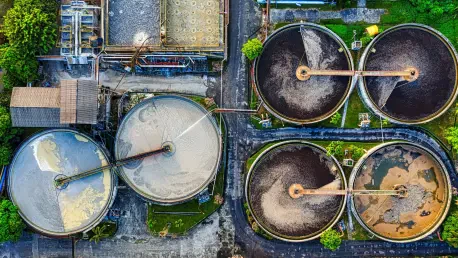In an era where industrial growth and environmental responsibility must coexist, Evonik, a global leader in specialty chemicals, has taken a bold step forward with its latest venture on Jurong Island, Singapore, representing not just an expansion of capacity but a profound commitment to sustainable practices that could reshape industry standards. With a significant investment in the mid-double-digit-million-euro range, the plant is designed to meet the soaring demand in the Asian market while prioritizing ecological balance. Capable of producing 100,000 metric tons annually, it serves as a cornerstone for industries like biodiesel production and chemical recycling, which are vital to advancing a circular economy. This development signals a shift toward localized, green manufacturing, highlighting how strategic investments can align with global climate goals. The focus on net-zero emissions and operational excellence at this site offers a glimpse into the future of chemical production, setting a benchmark for others to follow.
Strategic Expansion in Asia
The establishment of Evonik’s alkoxides plant in Singapore marks a pivotal moment in strengthening supply chain security across the Asian region. This facility, seamlessly integrated into a global network alongside sites in Germany, the U.S., and Argentina, enhances the company’s ability to respond swiftly to local market demands with precision and efficiency. By positioning production closer to Asian customers, Evonik reduces lead times and tailors solutions to regional needs, particularly in industries driving environmental progress. The plant’s strategic location on Jurong Island, a hub for chemical innovation, further amplifies its role as a critical node in the company’s operations. Beyond mere expansion, this move reflects a deep-rooted commitment to fostering partnerships in Asia, ensuring that clients benefit from both reliability and agility in an increasingly dynamic market landscape. The emphasis on proximity also minimizes logistical challenges, paving the way for more responsive and sustainable industrial practices.
Moreover, the Singapore plant underscores Evonik’s foresight in anticipating the region’s growing appetite for sustainable chemical solutions. As industries such as biodiesel production gain momentum, the demand for alkoxides—key compounds used in transforming vegetable oils and used cooking oils into eco-friendly fuels—continues to rise. Having a dedicated production hub in Asia allows Evonik to address this demand directly, eliminating dependency on distant facilities and reducing transportation-related carbon footprints. The investment also aligns with broader trends among global chemical companies to localize operations, balancing economic growth with environmental considerations. This approach not only bolsters Evonik’s competitive edge but also positions it as a trusted partner for Asian businesses navigating the transition to greener technologies. The facility’s role extends beyond production, serving as a catalyst for regional innovation and collaboration in sustainable industrial development.
Commitment to Net-Zero Emissions
A standout feature of Evonik’s Singapore facility is its groundbreaking design aimed at achieving net-zero Scope 1 and 2 carbon emissions, aligning with the company’s ambitious climate objectives. This focus on environmental stewardship is woven into every aspect of the plant’s operations, from energy-efficient processes to sustainable resource management, ensuring minimal ecological impact. Such dedication mirrors Singapore’s own vision for a green chemical industry, reinforcing the city-state’s status as a leader in sustainable industrial practices. The facility’s adherence to the highest environmental standards demonstrates that large-scale production and ecological responsibility can coexist, offering a model for others in the sector. This achievement was notably recognized during the plant’s inauguration, where high-level officials praised the seamless execution of the project, completed on time and within budget, as a testament to effective collaboration.
Equally significant is the broader impact of this net-zero commitment on the industries Evonik serves, particularly those tied to the energy transition. By producing alkoxides crucial for sustainable biodiesel, the plant directly supports efforts to reduce reliance on fossil fuels, contributing to a cleaner energy future. The facility’s innovative approach also sets a precedent for integrating sustainability into core business strategies, challenging the notion that profitability and environmental goals are at odds. This dual focus not only enhances Evonik’s reputation as a forward-thinking company but also amplifies Singapore’s appeal as a destination for green industrial investments. As global pressure mounts to address climate change, initiatives like this one provide tangible proof that industrial facilities can operate responsibly while meeting market demands. The success of this project highlights the potential for widespread adoption of similar practices across the chemical sector.
A Benchmark for Future Development
Reflecting on the journey, Evonik’s Singapore plant stands as a remarkable achievement in blending industrial prowess with environmental accountability. The swift completion of the project, underpinned by a substantial investment, showcases the power of strategic partnerships and meticulous planning. Its integration into a global production network elevates supply security, while the focus on net-zero emissions redefines what sustainable manufacturing can look like. Looking ahead, this facility offers valuable lessons for the industry on balancing economic imperatives with planetary well-being. Stakeholders are encouraged to explore how such models can be scaled or adapted to other regions, prioritizing localized production and green technologies. As the chemical sector evolves, leveraging innovations from this project could drive broader systemic change, ensuring that sustainability remains at the heart of industrial growth. The path forward lies in replicating and building upon these efforts to create a more resilient and responsible global market.









